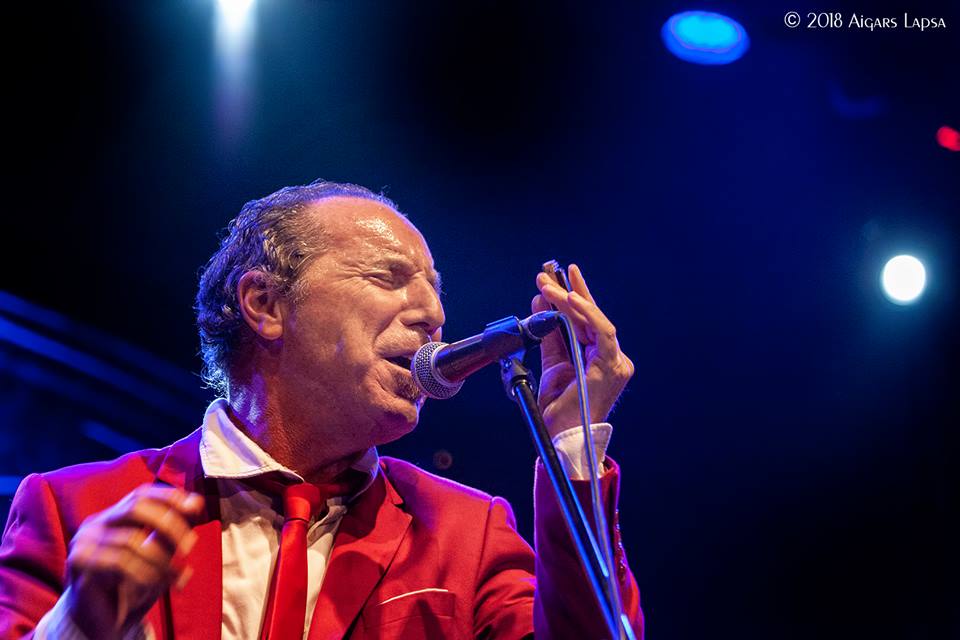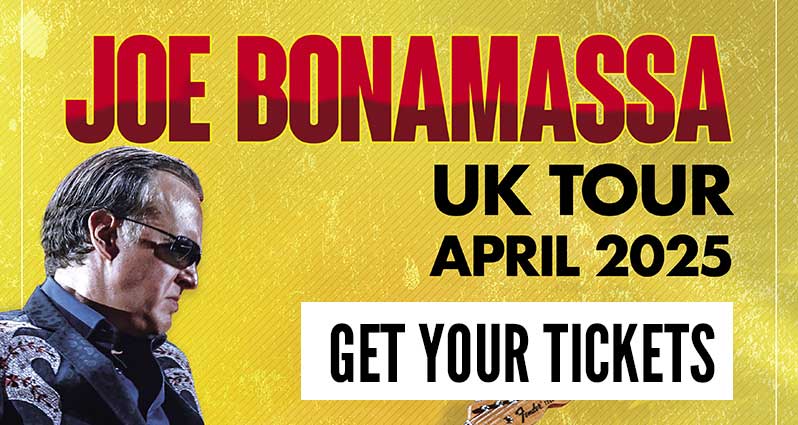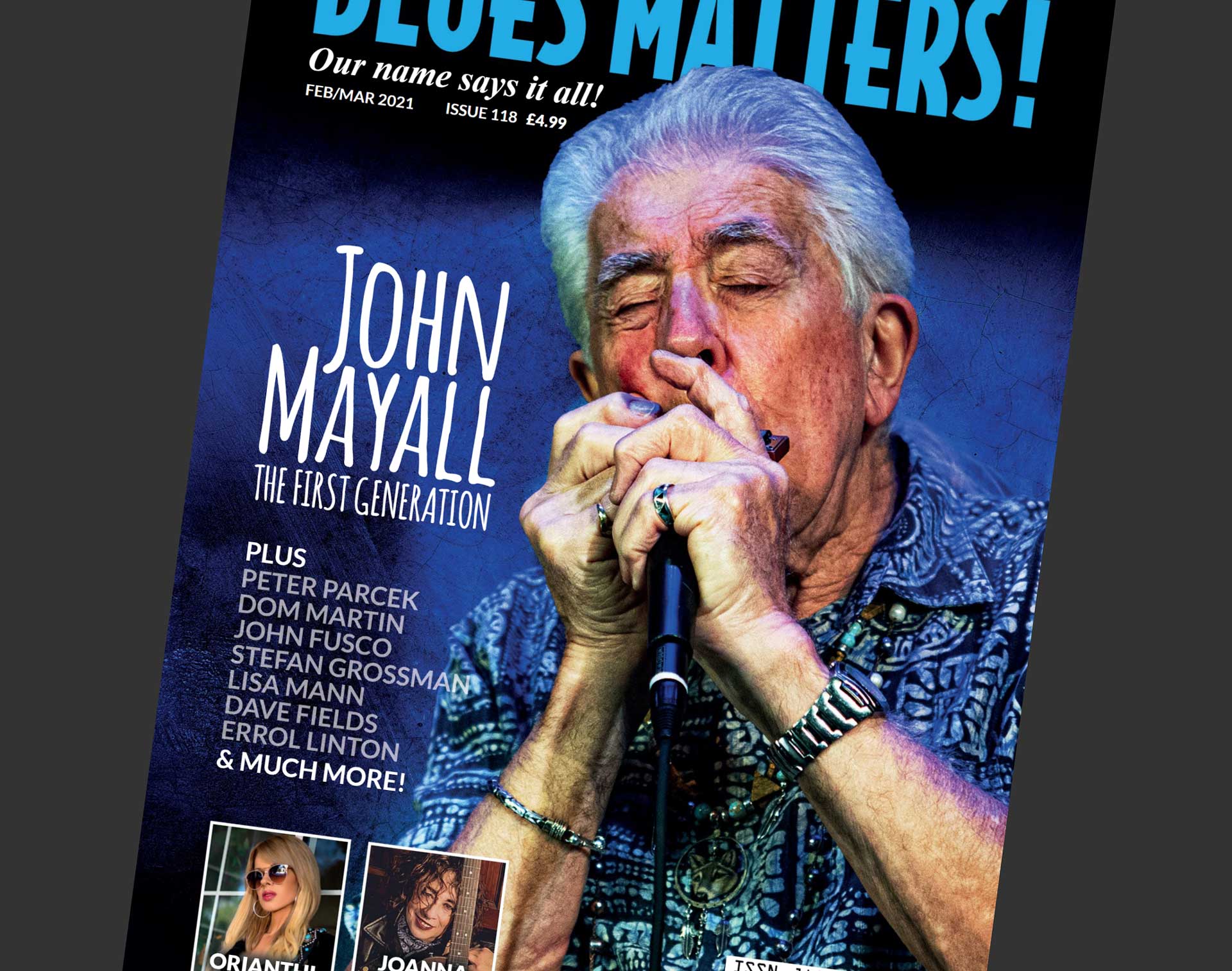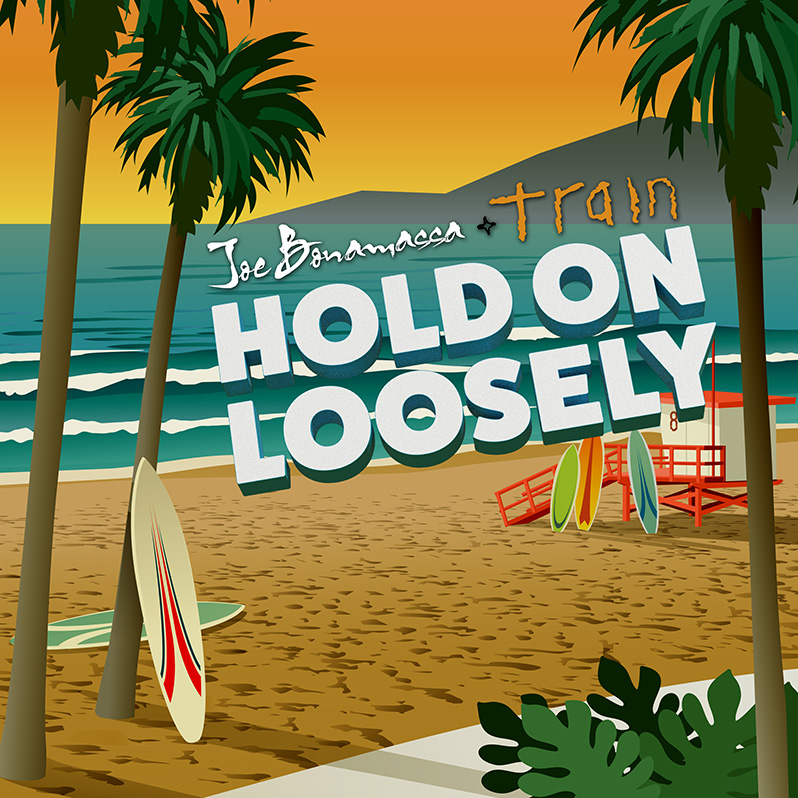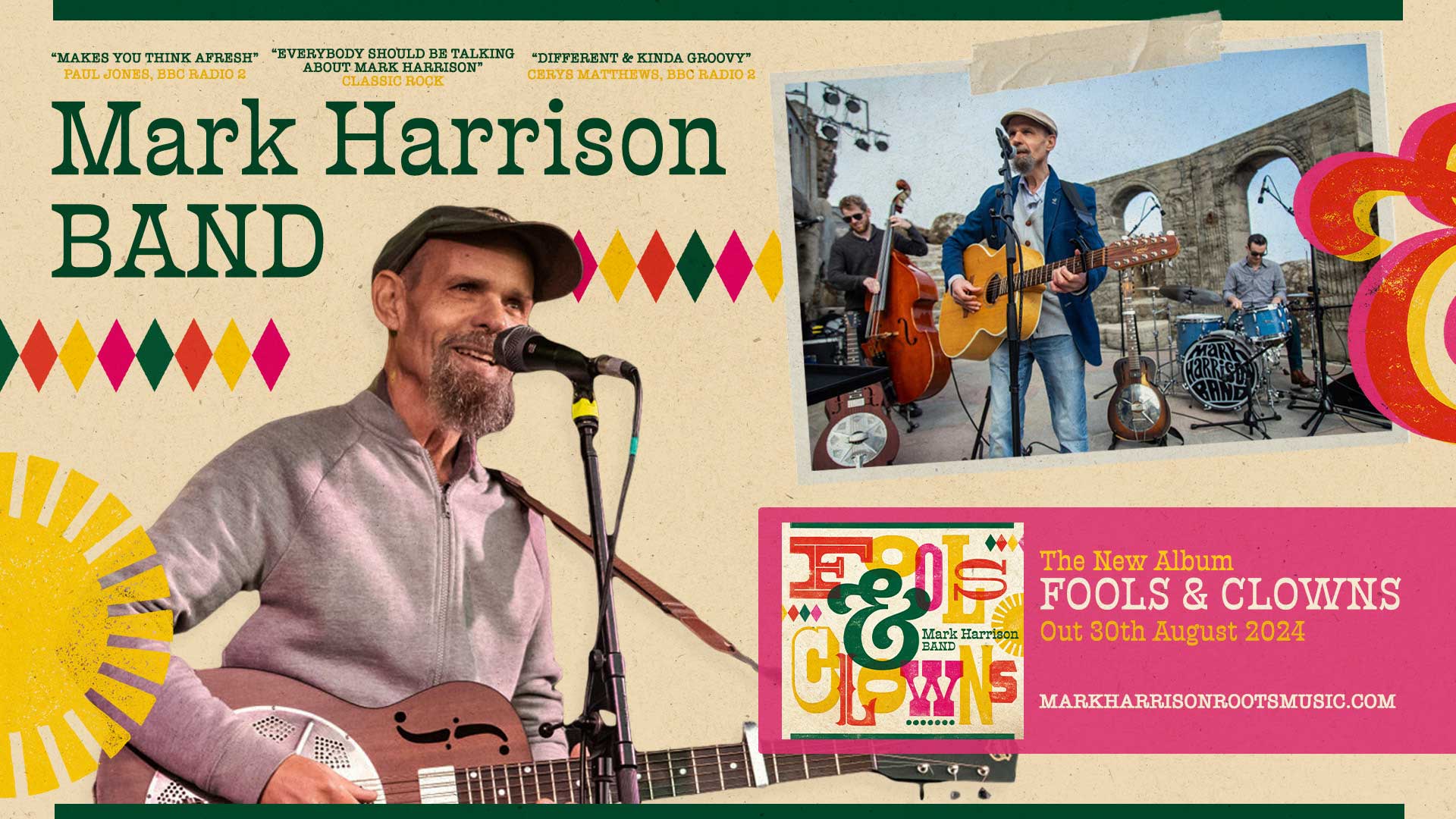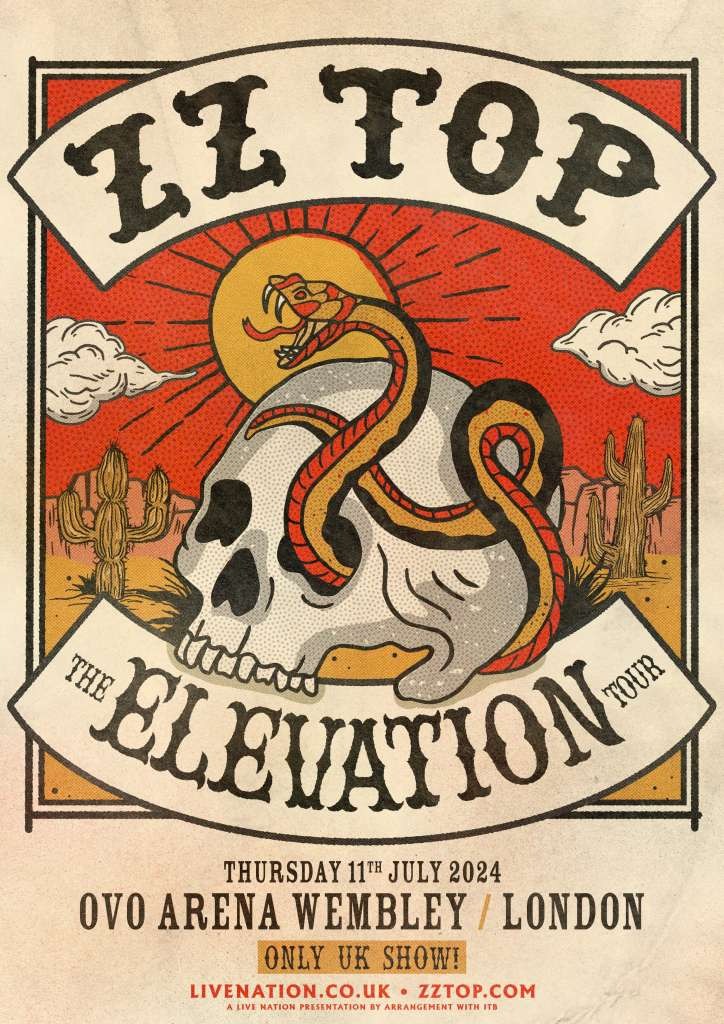Old School Blues With A Very Italian Flavour!
Egidio Ingala is a frontman and virtuoso harmonica player with his band The Jackknives they mix Chicago and West Coast blues styles and their concerts are high energy ones, and they are in high demand at many international festivals.
Their sound is very authentic and traditional but they all hail from Italy. Egidio has had several solo albums but formed The Jacknives in 2010. Their latest release “Switcharoo” gained many plaudits which we cover here during our recent catch-up.
Hi, Egidio thanks for taking time out to speak to Blues Matters magazine, where are you just now, touring or recording tracks for the next album?
I’ve just got home after a few days on tour, we did some gigs in Italy and Austria, but I’m just ready to leave again for a tour in Europe and Scandinavia. Then we’ll play on a blues cruise in Norway.
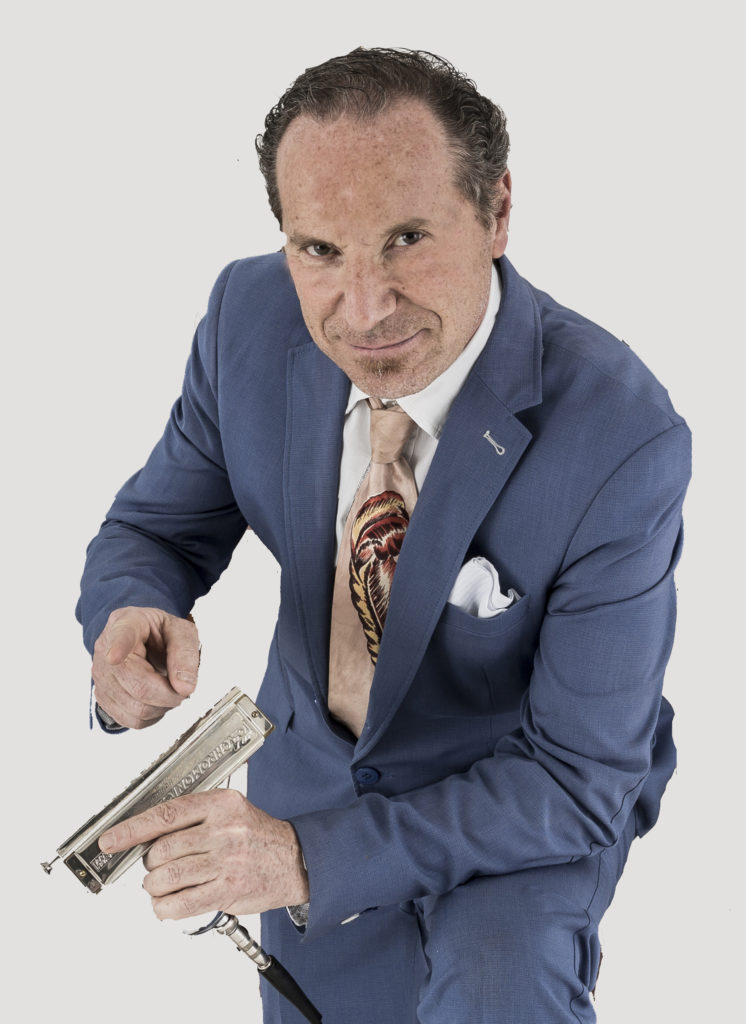
Let’s go back to the beginning of your career, did you always want to be a musician and what made you want to specialise in playing the harmonica, were there other instruments you could play?
Becoming a musician is something that must grow over time. Like in all kinds of music you need time to understand that you can make music your job. From my point of view choosing to play blues professionally requires a real knowledge of that kind of music, a great passion, the desire to challenge yourself, and above all you have to have something to say!
So, I made this choice over time after I had the chance and the luck to leave my previous job almost without any major problems. Playing blues should be a kind of musical education, but above all, it’s something that captures you without knowing the real reasons. I think everyone has a natural tendency for a kind of music; it can be found in the jazz lovers, in the classical lovers, rock and so also for the blues lovers.
Every kind of music has its own special ingredients, but it’s important to research the kind of music you love, to look at where that music comes from, how it develops, what influence it has had. In blues music the most important element for me is to know its history; blues means culture and tradition.
What a blues musician should do is go in search of this culture, look back and carry on the tradition; at least, that’s what I try to do. Regarding what made me want to specialise in playing the harp… for me it was like love at first sight. The first time I listened to a real blues harp was with Little Walter on a Muddy Waters record and I was impressed, that instrument had something unique, a scratchy, intense, emotional feel.
Blues harmonica for me is certainly something important; it’s not just a simple musical instrument, but the right tool that allows me to approach the blues, to play blues, to understand the blues. I see that the blues comes first, and then comes the instrument; it’s the instrument that I felt spontaneously closer to, along with the guitar as a basic blues instrument. If you know harmonica well, you can understand its emotional potential.
If you’re a musician sometimes ideas don’t come out so easily. So, I spent time where I didn’t feel ready to devote myself to a project with other musicians or with a band, and so I suffered from the fact that when you have no real ideas or projects you can get confused with a bunch of things, more than a real exchange of experiences between musicians.
I never wanted to consider myself as a “music professional”, but rather an amateur, and this is not a despicable thing for me, I tell you this because this approach has always pushed me to want to learn. I haven’t studied so much music, so compared to a musician who has studied professionally, I really feel like an amateur. Then the fact of considering me a non-professional makes me feel free to devote myself to other things that I like besides music, beyond the blues, even if it then remains the basic point of my life.
Where did you grow up and how did you first listen to the blues and know that was a career path for you? How did you get in touch with blues music and styles living in Italy?
I grew up in the Milan area, in northern Italy. I started to get interested in the blues after years of being a regular jazz listener. I started thinking about dedicating myself seriously to music when I was a member of the band Dirty Hands in the early 90s. That was an innovative band for the Italian scene; we played the blues that are very close to the Texan sound, mixing New Orleans with a lot of the West Coast sound. We had 10-12 gigs a month, at that time it was a lot.
That was the blues band of the moment. With them, I recorded a couple of records that were successful. The clubs were packed when we played there. In the meantime, I started to travel around the United States to get in touch with the reality of the blues, trying to catch the tricks of the trade, going to listen and see musicians in Texas, California, and New Orleans. After a few years, I started collaborating with some of those American musicians that I had met, and I started travelling around Europe with them to gain experience.
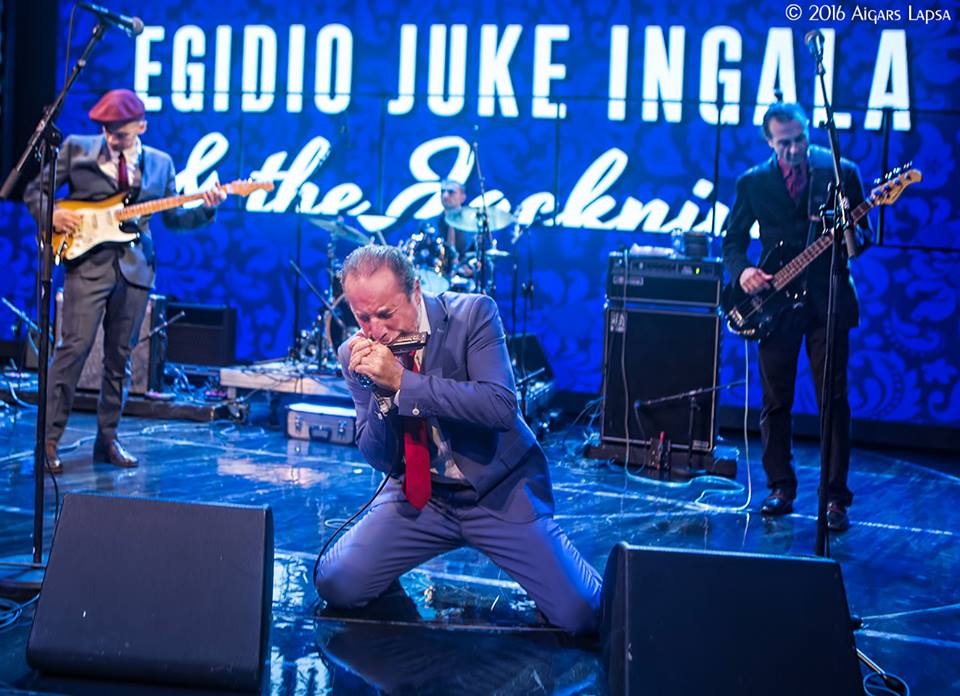
I had a long collaboration of four years with the Los Angeles guitarist Alex Schultz with whom I recorded a couple of records with for a German label around the year 2000. I have good memories of those early years with both the band Dirty Hands and later with the various collaborations that I had in particular with the great Lynwood Slim, an icon of the Chicago Blues mixed with the Swing, Jazz and Rhythm n’ Blues.
Slim was undoubtedly one of the greatest white singers and performers of that genre, he was a musician who influenced an entire generation of blues musicians. His way of mixing different musical styles relating to the blues got a following among many musicians, me too.
Are any of your family musical, who was your main influence on playing music. What type of music was playing in your house when you were growing up?
Well, both my parents were not really music lovers, but I grew up in the time where the Beatles and Rolling Stones were exploding and the music of Elvis, Chuck Berry and Bob Dylan was still in the air, so maybe all that sound influenced me.
My parents have never been musical, but they have always encouraged me a lot in this sense. Of course, they never expected me to become a blues musician, maybe for them that never really made sense but when the spirit calls, you got to move!
You chose harmonica who were, and are your favourite harmonica players? Your style sounds like a recipe consisting of Little Walter, mixed with George Harmonica Smith with the dessert being a touch of Walter Horton would that be true? What makes your style stand out from others?
As far as I’m concerned, the real school was the Chicago blues style, just like most blues harmonica players. My mentors were, and they still are, the two Walters (Little Walter and Big Walter Horton) and the two Sonny Boy’s (John Lee Williamson and Rice Miller) and of course the great George Harmonica Smith.
Little Walter has been, and will forever be, the true king of Chicago’s blues harmonica, he was able to expand and give new nuances to the blues, his licks and phrases were taken and copied by thousands of harp players and whenever you listen to his songs you can always find new things and new feelings. Little Walter for the blues was like Charlie Parker or John Coltrane for the jazz or Mozart and Chopin for classical music.
George Smith has a rather pure emotion, you can see many moods at the same time, and you can’t be indifferent. His licks with the chromatic harp have left their mark; he has also been a reference for many contemporary blues harp players like William Clarke, Rod Piazza, Kim Wilson and many others. Little Walter and George Smith, they played with a lot of swing and groove.
However, there are so many musicians who have influenced me. I studied a lot on Big Walter Horton records and Jimmy Reed, but also guitarists like T-Bone Walker, Freddy King, B.B. King, Pee Wee Crayton, and Tiny Grimes. Jazz musicians like Gene Ammons and Lester Young have always impressed me by their tone that they were able to create with the sax, a really fantastic sound! Even Roy Milton, Jimmy Liggins, Big Joe Turner, Wynonie Harris have influenced my musical taste a lot.
In recent years I’ve come back to listen to many jazz organists like Jack McDuff, Jimmy McGriff, these musicians especially in recent years have had a fair influence on my way of playing. I started to listen to them with a different ear, not just as a listener but also with the idea of catching something from them and then putting it into my licks and in my way of playing.
So, my style is a little bit the result of studying and listening to these great masters. I would say that my style is a swing approach, the songs of my repertoire range through various musical styles, blues, swing, rock n roll, rhythm and blues but always maintaining a blues atmosphere.
As a result, I like to give my harp playing, a sound that is at the same time painful and cheerful, and a mix of these two expressions which is then the essence of the blues itself.
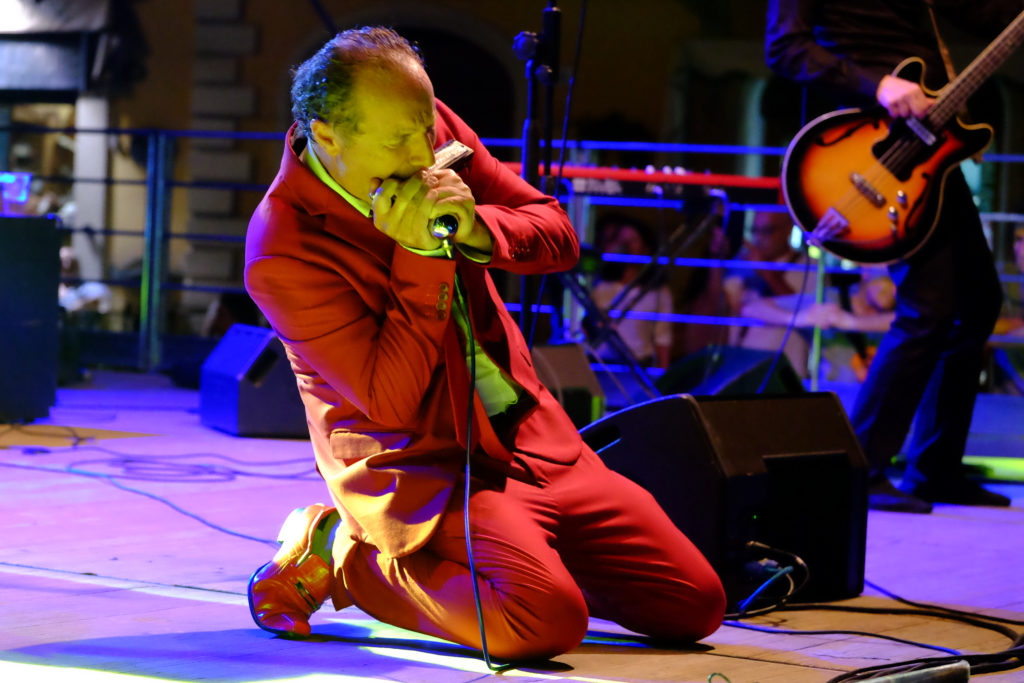
Where does “Juke” fit in with your image, how did you get that nickname? Does it fit in with your stage persona, you are a great showman, how did that come about, are you naturally a leader as such?
Juke is simply a song by Little Walter, perhaps the most famous one. It was one of the first tracks I tried to learn. Bringing that nickname is a responsibility but at the same time, it doesn’t make me forget that we only have to learn from the masters like Little Walter.
Regarding the way of being on stage, I live intensely the concert, when I play, I can throw out the emotions and in most cases are positive emotions. I start from the idea that I can’t play just for myself, so I like to look for empathy with the audience, with the band, with the musicians I’m playing with.
I don’t go looking for the show as an end in itself, I try to always be natural, and people perceive it and feel involved. Inside the band, I don’t feel like a leader, everyone has a role, even if then when we play some figures stand out, which are linked to the instrument that is played, to the character, this is natural, but everything is decided together.
Can you remember the first concert you played and where it was and who with?
In the 80s I was part of a local band, we played songs by Muddy Waters, Junior Wells, Slim Harpo, and B.B. King. So, we did the first concerts with that repertoire in the clubs around Milan. At that time the blues scene was very much alive in Milan; beautiful musical realities were born as in all of Italy. Unfortunately, now it has changed a lot.
What would you say the blue scene is like in Italy as such and do you listen to fellow European artists or do you prefer listening to American blues?
I listen to both, European and American musicians, certainly the American productions are more prolific, so I listen to them more. Here in Europe, we have such great blues musicians, of course, we don’t have the tradition and the culture of that music like Americans do and this is noticeable, but now the difference is not so marked as it was years ago. In Europe, wonderful collaborations between Europeans and Americans have grown, which have become great realities.
The music scene here in Italy has worsened in recent years. The few record labels have disappeared, so many clubs don’t play live music, or, at most, they want, cover bands. Abroad is quite different: in England, some locals even display “no cover band” signs, because people want to hear new things. As far as I’m concerned, I’m lucky to play a lot more abroad and this makes me understand how much diversity there is with Italy.
Around Europe it’s easier to meet musicians who already have a record label for years or a booking agency, for us, it’s much more difficult. Well, it’s true, our latest album “Switcharoo” was produced by the German label Rhythm Bomb but getting to this point was certainly not easy for us.
I think the State should be responsible for the conservation of cultural production, funding and sponsorship of blues, jazz and classical music events. I mean: we live in a situation where most young people no longer frequent clubs with live music, blues or a jazz concert. This says a lot about the degree of preparation and cultural sensitivity.
I would, at this point draw a parallel on what happens in our country that it’s the reflection of our society where everything that doesn’t bring “profit” should be cut. This happens for culture and even more for music. There is always less and less space for music, and do you know why? Because a concert doesn’t bring immediate economic profit, because making known and transmitting the values of a musical heritage don’t bring money.
So, why should you organise a blues concert that doesn’t allow you to make a profit? For the State and Government these things are a big misfortune in terms of profit, so they cut them. This way of acting will consequently lead to cutting all that is also the heritage of some kind of music like the blues and what the blues was as a cultural factor.
This way of acting leads to thinking only and exclusively to the future, where we may lose the sense of what that music was, we risk losing the identity of that music, and when we lose the real identity, we lose the sense to understand what music is now. From the social point of view, even the world of blues obviously suffered from the economic crisis, as well as the cultural one, which has hit the whole world for a few years.
The signals in the last period are not encouraging if we add that unfortunately today the places to offer their music are numerically very small. There are no new places to listen to music and as a result young people who want to pursue a career as a musician don’t have opportunities to make them known.
Undoubtedly, it’s a general situation, but in Italy, it seems worse. As I said the economic crisis is one of the reasons, they have reduced the budgets that each of us can devote to music, concerts or records, and as a result, has forced many historical clubs that first proposed the blues to change or close.
Can you give a brief history of the band’s you have been in, and how you got your band The Jacknives together?
I’ve been collaborating with The Jacknives for 8 years, and the thing that still keeps us together is certainly the fact that we all have a similar direction. We are all clear about what we wanna do, how we want to move, what direction we want to take.
The thing that keeps us tied is certainly the common passion we have for this music, the desire to explore but above all the desire to confront ourselves, this has certainly enriched us and matured us. The thing that I appreciate most from the band’s musicians is certainly the fact that they are not tied to any craze or flavour of the month. For several years the band has represented Italy on the European blues scene.
The thing that distinguishes us is our personal sound, direct and immediate. The main factor is that we try to offer live performances that are always energetic without excluding the quality of the music we play. The audience seems enthusiastic about us and this gives us hope to go on with this direction. In recent years we have played anywhere in Europe from Scandinavia to Poland, this year we were invited to the great Blues Heaven Festival in Denmark, where we played a tribute to George Harmonica Smith along with Steve Weston and the Finnish Helge Taqvil. It was a unique, beautiful experience.

The musicians who play with me, The Jacknives, were already famous for the support of the harmonica players they have had in the past, in a way that resembled the legendary Chicago blues trio, The Aces (Myers brothers and Fred Below). The leader of the band Marco Gisfredi is really one of the best blues talented guitarists on the scene today. Inspired by Eddie Taylor, T- Bone Walker, Louis Myers and many other greats, he cut his teeth playing behind players like Paul Oscher, Steve Guyger, Mark Hummel, Lynwood Slim, Mike Sanchez and many others.
The band’s rhythm section is formed by the rock-solid bassist Max Pitardi and the extraordinary drummer Enrico Soverini, whose love and knowledge of the fine points in this music allows them to play anything from down-home blues to more sophisticated urban grooves. Max was one of the founding members of the “Dirty Hands” and he already played with me from 1993 to 1997.
Enrico with his drums, quotes Fred Below, Odie Payne and SP Leary among his main influences, he has played all over Europe in blues and American music bands, also offering his appreciated solid backbeat to many American musicians on tour.
Every musician in the band has spent a lot of time getting to know the meaning of this music, and in my opinion, this should be the approach of all musicians, sometimes it can take years to learn the language of the blues and be able to play it. It’s a fact of study and approach to music!
You kindly sent me your top 10 favourite releases, could you maybe talk about 5 of them here. Noting them, I would classify tunes by, originality, influence, technique and sheer emotional content, what is your take on this and why you have chosen them?
1. George Harmonica Smith – Harmonica Ace
2. Junior Wells – Hoodoo Man Blues
3. Little Walter – The Complete Chess Masters
4. Muddy Waters – The Chess Box
5. Hollywood Fats Band – Rock This House
In blues, as in many musical genres, it’s almost impossible to make a ranking of the best records but surely each of us is tied to records that have given a sign to their musical growth. Sincerely for me, it was really hard to choose them and it’s almost impossible to get everything I want on a list of 5 records, but I try all the same to think of those records as milestones on my blues road.
If I think about it…I didn’t even have the space to add T-Bone Walker, Freddie King, B.B. King, Clarence “Gatemouth” Brown, Robert Nighthawk, Lightnin’ Hopkins; and their releases are ones that I will never get tired of listening to and it would be really useful to introduce people to the blues of these masters. Or at least this is my opinion.
I have specifically chosen those five records because, probably they are those records that taught me everything I know now about the harmonica blues, those records that for different reasons have marked my musical career, especially at the beginning.
I already talked about Little Walter and George Smith; they are the two musicians at the top of the pyramid. George was a powerful harmonica player with a great sense of swing as well as being an exceptional singer. He was very creative and really played with his heart. He admired all the great musicians, but he had his sound and his style. It was a true original. He was a pleasant and kind person.
Perhaps this is also due to the fact that he never managed to get the recognition that he really deserved. He was a “too quiet” guy to become a Junior Wells or a Howlin’ Wolf. But if you listen carefully to George, especially on this “Harmonica Ace” record, you can really feel the purest essence of the blues thanks to the splendid “interplay” that he was able to create among the musicians. George has had a great influence on me, both on my way of playing and singing.
This Hoodoo Man Blues by Junior Wells it’s the record where I really got to Know Junior. There are a few essential albums, and this is one of them. An awesome blues album. “Old School” Chicago style with the great Buddy Guy playing guitar. Great sense of rhythm, blues mixed with Rhythm n Blues, a use of harmonica and voice that for me were still unknown.
Muddy Waters was the most important bluesman in Chicago and probably the best, and his songs and his style have been proposed by most blues musicians around the world for decades. No blues collection could be complete without Muddy Waters and this Box Chess record is a must for all true blues fans.
This album by Hollywood Fats opened my eyes to that sound that I thought could belong only to black musicians, maybe it’s the album that helped me to get in a definitive way in my career as a blues musician. A whole band of white people, an extraordinary band. With Jimmie Vaughan and Junior Watson, Fats was one of the most innovative, often imitated but never reached up.
What would be your best advice to somebody starting to play the harmonica? Also, would this be similar advice to somebody starting out in the music business?
My best advice to somebody starting to play the harmonica? I’d like to answer this question making one preliminary remark. In Blues music the most important element is to know its history; blues is culture, tradition. What a person or a musician should always do and especially at the beginning is go in search of the culture, look back, at least that’s what I try to do.
In blues music everything has already been written, the best things were born in the 50s where there was a real ferment of ideas and musical activity around all the black-American music, so then look back at that time, learn from the music that was made at that time and then develop your own musical taste.
Don’t go too much in search of sound as an end in itself, but in the approach towards the instrument like an integral part of the blues. These two elements can’t be separated from each other. The harmonica and the sound, also intended as tone, have to be an integral part of the blues.
The great masters of the harmonica blues were mainly and initially great experts and fans of the blues, before becoming harmonica players. It’s not important to have a great technique if it’s not supported by an incisive and decisive tone, the right “groove”, comes from there. So, you should try to play with your own style but bound up in the tradition, to the history and culture of blues.
I appreciate when people listen to my records or my harmonica licks and say: “This sounds good, I have never heard it before in this way “. I don’t mean about the technical factor, but more than that, about, expressions and emotions. So, when you want to start playing you have to start listening and learning every secret and every technique that the great masters have left us as an inheritance, pay attention to how each phrase is played and at the same time listen to how the song develops.
In my opinion, these are the fundamental elements, the basis on which we should all work to build and get the sound we want, whatever it is … distorted, clean, warm, bright, dry or who knows. Another thing… don’t play just to make money but for the pleasure of playing. Music should be loved for what it is. If someone were to play only for his own profit, his purpose, his work and his result will be very poor.
What is the best advice you have had in your musical career?
I’ve had a lot of advice from different musicians, and for sure the most useful advice was those that changed my way of playing like: “try to be as original as possible, but always remain faithful to the authentic blues musicians, without being too much of an imitator.” This is something that maybe takes a bit of time. Gary Primich often told me that.
Or “try to play in a very simple way, not too fast, you have to slow down and make the right licks in each song. The important thing is to do it with the soul, from the bottom of your heart, and this really counts”. That is because I was used to playing too fast, so I tried to go in that direction, and I assure you that things have been much better. Now I try to pass this advice on to other musicians.
Best advice you have had in your own lifetime?
I try to follow this wise piece of advice: “Always be able to accept what life offers you”. This would touch moments of life even outside music; I would recommend it to everyone.
On your 2017 release Switcharoo produced by Little Victor who also plays on this, there are so many layers to the music and styles, and it all sounds so authentic how do you get that analogue type sound? Indeed, how did this release come about and have you any more plans for forthcoming projects with Little Victor?
Well, I’m glad you noticed the work that was done for the sound. You’re right; Switcharoo is a record which has an “authentic sound”. After the first phase of recording in Italy, all the tracks were mixed in California by Danny Michel and the supervision of John Atkinson and Victor. The work we did together with the producer was to work on the starting sounds.
I have always believed that a great, beautiful and fair sound doesn’t come by itself, you can’t get it from a reel tape recorder, or from the 50s amp. The right sound is produced from the beginning and this goes beyond the technologies used, be analogue or digital.
Sometimes I think we should resize a little bit the idea of “vintage”. There is no doubt that the sound of old vinyl records is fascinating, but it doesn’t depend solely on the method we used, analogue or digital machines, but on what procedures are used and by the production work, certainly, it doesn’t depend on the technology used. The sound, for me, is a purely artistic, not a technological concept, you know what I mean…!? If the production of the sounds is not taken care of from the beginning and at the end, it’s certainly not the fault of the machines!
Searching for the right sounds and a well-done mix certainly make the difference compared to the recordings made quickly, without due attention. We don’t know now if the collaboration with Victor will lead to work in the future, for now, we are happy with the work done both with him and with the record label Rhythm Bomb that has supported our project very well.
Outside of touring what do you do to relax, have you got any hobbies or interests you want to share?
I listen to a lot of music, I like reading, and I like mountains and wine. I also am a harmonica teacher, I work for a couple of music schools and I do a lot of private lessons.
What is your preferred venue to play, small clubs or large festival arenas, do you have any preferences?
I like medium-small clubs, the sound is better, and the audience is close.
Do you have any plans to play in the UK soon?
Not for now. I would love it, but I don’t have an agent or agency in the UK, so I’ll wait.
If you were not a musician what do you think you would be?
Maybe I’d have liked to teach, work in the world of schools, teaching. I like to empathize with people. Or manage a Sicilian restaurant!
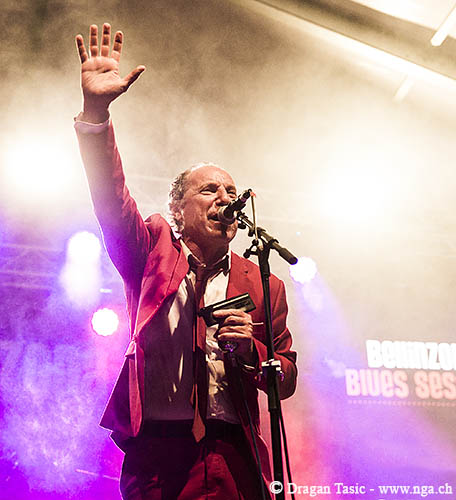
What makes you keep on playing music what’s the driving force? Has the relationship with the audience got any influence on this, you really look like you enjoy entertaining, give me three tips you have learned in being a great showman and giving the audiences what they want?
The reason why after years I’m still tied to this kind of music is that playing blues has allowed me to find that way of expressing myself, that I have not yet been able to find from any other expression of art, So I really like to combine the music that I’m playing with the show, it’s very natural to me, I like to express myself in that way, with a sincere approach to the audience, a sort of exchange of emotions that allows me to be myself and give what I have inside on a musical level but above all on an emotional level.
A blues concert should always have some give and take. This is how I am on stage and the concert, and this is what I recommend to those who go on a stage to play blues.
What are your future plans say for the next five years?
I don’t have big plans in mind; I would just like to continue the way I am working now.
Anything you want to say to the blues audience reading this around the world? Any last thoughts or stories from the road or is that a closed subject?
Perhaps the last consideration to make is on how I see the situation now, sometimes I’m worried about the future of this music, and the new generations seem to not really be interested. Of course, there are some good young guitarists and harp players around but frankly, I don’t see new musicians on the horizon that can carry forward what the greats of the past have created. Unfortunately, the tendency of young people is to imitate, because imitating makes life very easy.
I think that musicians in the past practised more and were proud of their way of making music. Sometimes I see that younger musicians don’t work hard enough to reach a sufficiently high level of musicality. My hope is that young people will really come back to blues, jazz and face the music and appreciate it even more than in the past.
I think none of us can live without music and culture, but more and more generations are growing up who are losing their sensitivity to these things and that the only thing this society is teaching to young people is to earn as if the dignity of man has to necessarily be linked to the money that people earn. This is the thing that worries me.
Thanks for chatting, good luck for the future, loving your music, take care.
Interview by Colin Campbell
For more information see website: www.egidioingala.com
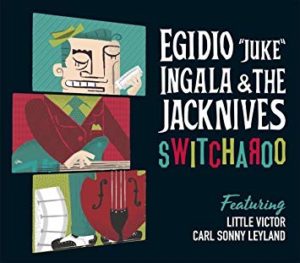
Discography:
Egidio “Juke” Ingala And The Jackknives
Switcharoo-2017
Tired Of Beggin’-2013
Egidio “Juke” Ingala
Game’s Over-2007
Drivin’ And Jivin’-2004
Nite Life Boogie-2000
The Dirty Aces
Four Cool Cats-1995
XXX Hot Chilli-1993

